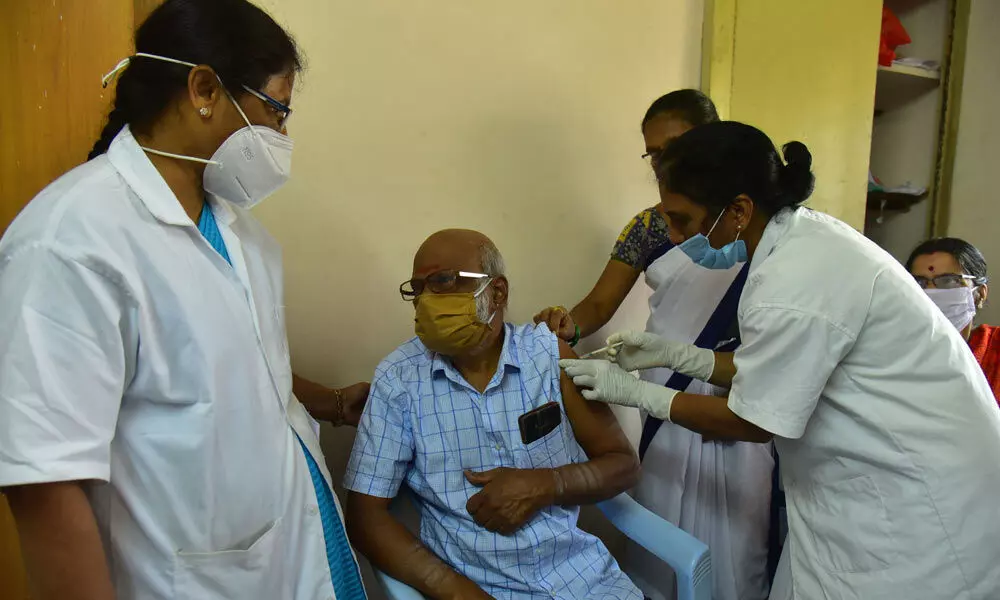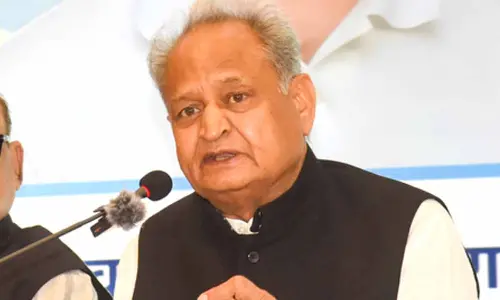No serious side-effects from Covaxin: Lancet

Covid-19 vaccine drive for people above 60 years conducted at Gandhi Hospital on Tuesday. -Photo: Adula Krishna
Leading medical journal says need for further corroboration with phase-3 safety trials
Koti: Covaxin, India's first indigenous vaccine for Covid-19, is "safe, immunogenic with no serious side effects," says the leading medical journal The Lancet in its interim efficacy analysis. The Lancet - Infectious Diseases Journal, published phase-2 results of the vaccine developed by the city-based Bharat Biotech.
However, the report made it clear that efficacy cannot be determined by phase 2 trials and this required further corroboration with phase 3 safety results. "The results reported in this study do not permit efficacy assessments. The evaluation of safety outcomes requires extensive phase 3 clinical trials. We were unable to assess other immune responses (ie, binding antibody and cell-mediated responses) in convalescent serum samples due to the low quantity. Furthermore, no additional data on the age of the participant or the severity of disease from symptomatic individuals were obtained," says the report.
It also pointed out that comparisons between phase 1 and 2 trials were not done in a randomised set of participants, and no adjustments on baseline parameters were made. "Conclusions are to be considered as post-hoc analyses. Even though direct comparisons between the phase 1 and 2 trials cannot be made, the reactogenicity assessments reported in this study were substantially better in the phase 2 trial than the phase 1 trial and other trials with a placebo group," it added.
The report says that the proportion of participants reporting adverse events in the phase 2 trial were lower than in the phase 1 trial. The study coordinators have verified all source documents to ensure that no data were missing or that errors had occurred.
"Further corroboration with phase 3 safety results is required. This study enrolled a small number of participants aged 12-18 years and 55-65 years. Follow-on studies are required to establish immunogenicity in children and in those aged 65 years and older." It did a double-blind, randomised, multicentre, phase 2 clinical trial to evaluate the immunogenicity and safety of Covaxin in healthy adults and adolescents (aged 12-65 years) at nine hospitals in India.
The most common adverse event in the phase 2 trial was pain at the injection site, followed by headache, fatigue, and fever. No severe or life-threatening solicited adverse events were reported.
Two intramuscular doses of vaccines were administered, four weeks apart, in 380 healthy children and adults. Higher neutralising antibody titres (2-fold) was observed in the phase 2 study than in the phase 1 study. In a follow-up of the phase 1 trial, Covaxin produced, durable antibody and T-cell responses 3-months post-vaccination. It said that 6 and 12 months follow-up studies are ongoing.
After 2-doses, local and systemic adverse reactions observed in both vaccine groups were minimal. Probability of experiencing a side effect was 10-12 per cent, which is 6-times lower than other Emergency Use Authorized vaccines.
Covaxin, developed by Bharat Biotech in partnership with the Indian Council of Medical Research (ICMR) was granted emergency approval in January before data from its final stage testing. The move by the drug regulator raised concerns about safety and effectiveness of the vaccine Though Covaxin was included along with Covishield for nation-wide immunization launched on January 16, healthcare workers and frontline staff showed reluctance in taking Covaxin.
When the second phase of vaccination began on March 1, Prime Minister Narendra Modi took Covaxin shot and this is believed to have increased the confidence among beneficiaries.
Last week, Bharat Biotech released phase 3 results Covaxin and claimed that the vaccine demonstrated 81% interim efficacy in preventing Covid-19, in those without prior infection, after the second dose.
SO FAR SO GOOD
♥ The report says that the proportion of participants reporting adverse events in the phase 2 trial were lower than in the phase 1 trial
♥ The study coordinators have verified all source documents to ensure that no data were missing or that errors had occurred
♥ The most common adverse event in the phase 2 trial was pain at the injection site, followed by headache, fatigue, and fever. No severe or life-threatening solicited adverse events were reported
♥ Last week, Bharat Biotech claimed that the vaccine demonstrated 81% interim efficacy in preventing Covid-19, in those without prior infection, after the second dose

















